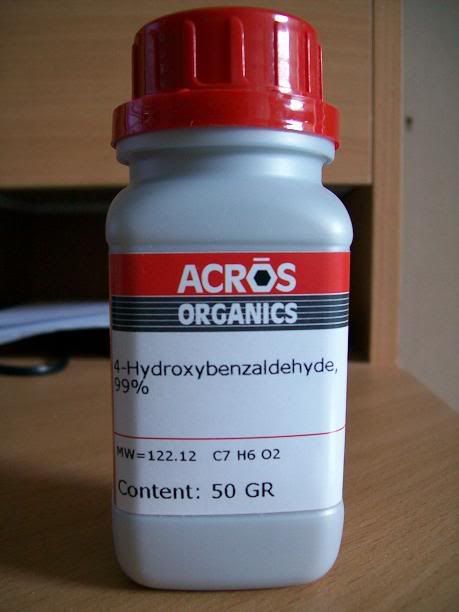| Pages:
1
2 |
Klute
International Hazard
    
Posts: 1378
Registered: 18-10-2006
Location: France
Member Is Offline
Mood: No Mood
|
|
thank you very much for that article Painkilla. It seems p-alkoxybenzenes are suffcirently activated to provided good yield in that reaction. Maybe I
could use the benzyl protecting group, and remove it at the same time as I reduce the double bond by hydrogeantion. I will need to check if such
deprotection can proceed at ATM pressures, IIRC high pressures are commonly used.
\"You can battle with a demon, you can embrace a demon; what the hell can you do with a fucking spiritual computer?\"
-Alice Parr
|
|
|
PainKilla
Hazard to Others
  
Posts: 306
Registered: 29-4-2004
Member Is Offline
Mood: No Mood
|
|
If I remember correctly, the lower end of reactivity required for good yields with bromomethylation is chlorobenzene. Chloromethylation does not yield
well with chlorobenzene. Thus, I think just about any substrate with an aromatic ether/hydroxy group will work well for halomethylation.
What is perhaps more interesting than the bromomethylation, is the oxidation of the corresponding halide to the benzaldehyde using ethanol/h2o2 as
posted earlier... That is just about the simplest procedure (and quite well yielding too) that I have seen for such a conversion.
|
|
|
Klute
International Hazard
    
Posts: 1378
Registered: 18-10-2006
Location: France
Member Is Offline
Mood: No Mood
|
|
Indeed, it seems very simple. But it needs practical backing up IMHO? thet fact that there is very little mention ofthis method isn't very reassuring.
Maybe it works well only with specific substartes, or generally has lower yields than the sommelet?
I would expect some oxidation of the aldehyde by excess H2O2? Have you got experience with the sommelet? The only time I tried it was on a substrate I
supposed to a benzyl chloride, but as it came out unchanged, I guess it was something else (cf. benzylic alcohols oxidation thread).
For my use I might better be off using the benzyl halide directly for alkylating sodium ethyl acetoacetate, but if this EtOH/H2O2 method works out
well enough, it sure would be good news.
\"You can battle with a demon, you can embrace a demon; what the hell can you do with a fucking spiritual computer?\"
-Alice Parr
|
|
|
PainKilla
Hazard to Others
  
Posts: 306
Registered: 29-4-2004
Member Is Offline
Mood: No Mood
|
|
I've never used the Sommelet reaction, however I am sure it will work exactly as advertisted. German journals have always worked well for me and tend
to be reliable and very reproducible. The ethanol-h2o2 oxidation is a bit sketchy, but it's so simple to try the procedure...
I'd do it myself, but I am currently away from home.
As far as further oxidation... it might occur, but it doesn't really matter as I imagine any such procedure would isolate with NaHSO3 anyway, so
impurities are nicely avoided.
There are lots of ways from halides to benzaldehydes... I remember a few using DMSO, though I don't have the references nearby. The traditional halide
--> alcohol --> aldehyde has long been used too, and I should think that the yields be no lower than 50% for total conversion.
[Edited on 25-6-2008 by PainKilla]
|
|
|
Klute
International Hazard
    
Posts: 1378
Registered: 18-10-2006
Location: France
Member Is Offline
Mood: No Mood
|
|
The problem to p-hydroxybenzaldehyde has been solved:

  
A bit more expensive that I would have liked, but I've been dying to make Rheosmin since some time now 
Details on the condensation and reduction to Raspberry ketone to come in the dedicated thread.
[Edited on 15-7-2008 by Klute]
\"You can battle with a demon, you can embrace a demon; what the hell can you do with a fucking spiritual computer?\"
-Alice Parr
|
|
|
Ephoton
Hazard to Others
  
Posts: 463
Registered: 21-7-2005
Member Is Offline
Mood: trying to figure out why I need a dark room retreat when I live in a forest of wattle.
|
|
this is probably a little late but I have always had great success with the sommelet reaction.
though I advise not too use alcohol as the solvent but rather water.
I would say the problems you had were the benzyl halide you had.
all I do is add benzyl halide too hexamine with water and then reflux for a few hours.
once it is near finishing I setup for distillation and aldehyde comes over with water.
I add more water to distillation flask until no more aldehyde comes over.
a very very easy reaction if you have benzyl halide.
works for all three mono di and tri benzyl halides.
a bit off topic but still this was discussed above.
sorry.
e3500 console login: root
bash-2.05#
|
|
|
Klute
International Hazard
    
Posts: 1378
Registered: 18-10-2006
Location: France
Member Is Offline
Mood: No Mood
|
|
Nice, great to hear some succes! Did you try dilute AcOH?
What benzyl halide was this?
\"You can battle with a demon, you can embrace a demon; what the hell can you do with a fucking spiritual computer?\"
-Alice Parr
|
|
|
| Pages:
1
2 |